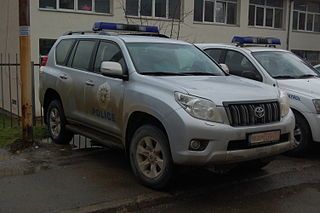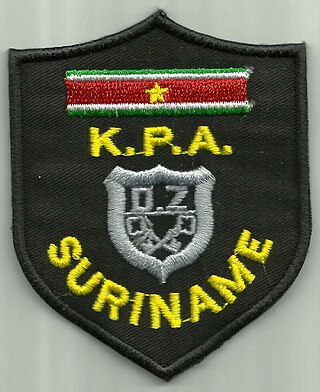Related Research Articles
A violent crime, violent felony, crime of violence or crime of a violent nature is a crime in which an offender or perpetrator uses or threatens to use harmful force upon a victim. This entails both crimes in which the violent act is the objective, such as murder, assault, rape and assassination, as well as crimes in which violence is used as a method of coercion or show of force, such as robbery, extortion and terrorism. Violent crimes may, or may not, be committed with weapons. Depending on the jurisdiction, violent crimes may be regarded with varying severities from homicide to harassment. There have been many theories regarding heat being the cause of an increase in violent crime. Theorists claim that violent crime is persistent during the summer due to the heat, further causing people to become aggressive and commit more violent crime.
Yardie is a term often used, particularly within the Caribbean expatriate and Jamaican diaspora, to refer to people of Jamaican origin, though its exact meaning changes depending on context. The term is derived from the Jamaican patois for “home” or "yard". The term may have specifically originated from the crowded "government yards" of two-storey government-funded concrete homes found in Kingston and inhabited by poorer Jamaican residents, though "yard" can also refer to "home" or "turf" in general in Jamaican patois.

The war on drugs is the policy of a global campaign, led by the United States federal government, of drug prohibition, military aid, and military intervention, with the aim of reducing the illegal drug trade in the United States. The initiative includes a set of drug policies that are intended to discourage the production, distribution, and consumption of psychoactive drugs that the participating governments, through United Nations treaties, have made illegal.

A drug-related crime is a crime to possess, manufacture, or distribute drugs classified as having a potential for abuse. Drugs are also related to crime as drug trafficking and drug production are often controlled by drug cartels, organised crime and gangs. Some drug-related crime involves crime against the person such as robbery or sexual assaults.
Albanian mafia or Albanian organized crime are the general terms used for criminal organizations based in Albania or composed of ethnic Albanians. Albanian organized crime is active in Europe, North America, South America, and various other parts of the world including the Middle East and Asia. The Albanian Mafia participates in a diverse range of criminal enterprises including trafficking in drugs, arms, and humans. Thanks to their close ties with the 'Ndrangheta of Calabria, they control a large part of the billion dollar wholesale cocaine market in Europe and appear to be the primary distributors of cocaine in various European drug hubs including London. Albanian organized crime is characterized by diversified criminal enterprises which, in their complexity, demonstrate a very high criminal capacity. In Albania, there are over 15 mafia families that control organized crime.
Crime has been recorded in the United States since its founding and has fluctuated significantly over time, with a sharp rise after 1900 and reaching a broad bulging peak between the 1970s and early 1990s. After 1992, crime rates have generally trended downwards each year, with the exceptions of a slight increase in property crimes in 2001 and increases in violent crimes in 2005-2006, 2014-2016 and 2020-2021. While official federal crime data beginning in 2021 has a wide margin of error due to the incomplete adoption of the National Incident-Based Reporting System by government agencies, federal data for 2020-2021 and limited data from select U.S. cities collected by the nonpartisan Council on Criminal Justice showed significantly elevated rates of homicide and motor vehicle theft in 2020-2022. Although overall crime rates have fallen far below the peak of crime seen in the United States during the late 1980s and early 1990s, the homicide rate in the U.S. has remained high, relative to other "high income"/developed nations, with eight major U.S. cities ranked among the 50 cities with the highest homicide rate in the world in 2022. The aggregate cost of crime in the United States is significant, with an estimated value of $4.9 trillion reported in 2021. Data from the first half of 2023, from government and private sector sources show that the murder rate has dropped, as much as 12% in as many as 90 cities across the United States. The drop in homicide rates is not uniform across the country however, with some cities such as Memphis, TN, showing an uptick in murder rates.

Crime rates in Portugal are generally low, and most crimes are non-violent. Portugal's security and peace indicators compare favourably to those of other countries; According to the Institute for Economics and Peace's 2022 Global Peace Index report, Portugal ranks as the 6th most peaceful country in the world.

Crime and violence affect the lives of millions of people in Latin America. Some consider social inequality to be a major contributing factor to levels of violence in Latin America, where the state fails to prevent crime and organized crime takes over State control in areas where the State is unable to assist the society such as in impoverished communities. In the years following the transitions from authoritarianism to democracy, crime and violence have become major problems in Latin America. The region experienced more than 2.5 million murders between 2000 and 2017. Several studies indicated the existence of an epidemic in the region; the Pan American Health Organization called violence in Latin America "the social pandemic of the 20th century." Apart from the direct human cost, the rise in crime and violence has imposed significant social costs and has made much more difficult the processes of economic and social development, democratic consolidation and regional integration in the Americas.

Crime in Paraguay has increased in recent years with criminals often targeting those thought to be wealthy. Although most crime in Paraguay is nonviolent, there has been an increase in the use of weapons and there have been incidents where extreme violence has been used.
A drug lord, drug baron, kingpin, or lord of drugs is a type of crime boss in charge of a drug trafficking network, organization, or enterprise.
Crime in Honduras has become a growing matter of concern for the Honduran population in recent years. Honduras has experienced alarmingly high levels of violence and criminal activity, with homicide rates reaching a peak in 2012, averaging 20 homicides per day. Corruption, extortion, coercion, and drug smuggling also run rampant throughout Honduran society, preventing the nation from building trustworthy authorities like police, and severely limiting economic, social, or political progress. The situation has prompted international organizations and governments to offer assistance in combating crime in Honduras.
Crime in Haiti is investigated by the Haitian police. Since the late 2010s, the country has suffered from widespread gang warfare and civil unrest, including a massive prison breakout in 2024. It also suffers from extreme corruption and high levels of sexual violence.

Kosovo within communist Yugoslavia had the lowest rate of crime in the whole country. Following the Kosovo War (1999), the region had become a significant center of organized crime, drug trafficking, human trafficking and organ theft. There is also an ongoing ethnic conflict between Kosovar Albanians and Kosovan Serbs. The large Kosovar diaspora which had built up in Western Europe during the 1990s, combined with the political instability, created ideal conditions for Kosovo to become "Europe's crime hub"; well into the 2000s, Kosovo remained associated with both ethnic conflict and organized crime. A Kosovo Police service has been built up under UN administration, beginning in 1999. It had an operational force of 7,000 officers in 2004, and further expanded to 9,000 by 2010. The deplorable crime rate led to an additional deployment of civilian law enforcement resources of the European Union to Kosovo, under the name of European Union Rule of Law Mission in Kosovo in 2008. Originally scheduled for two years, the duration of the deployment was extended twice, as of September 2012 scheduled to last until 2014.

Overall, rates of crime in Spain are relatively low in comparison to other European countries, with the notable exception of robberies. In 2022 it was listed as number two out of 35 states in Europe with regard to the number of police-recorded robberies relative to population size, although in 2020 it had a lower homicide rate than the European Union average.
Colombia has a high crime rate due to being a center for the cultivation and trafficking of cocaine. The Colombian conflict began in the mid-1960s and is a low-intensity conflict between Colombian governments, paramilitary groups, crime syndicates, and left-wing guerrillas such as the Revolutionary Armed Forces of Colombia (FARC), and the National Liberation Army (ELN), fighting each other to increase their influence in Colombian territory. Two of the most important international actors that have contributed to the Colombian conflict are multinational companies and the United States.
Organized crime in the Netherlands, sometimes called penose is the organised criminal underbelly in Amsterdam and other major cities. Penose usually means the organizations formed by criminals of Dutch descent. It is a slang word coming from the old Amsterdam Bargoens language.
Crime in Venezuela is widespread, with violent crimes such as murder and kidnapping increasing for several years. In 2014, the United Nations attributed crime to the poor political and economic environment in the country—which, at the time, had the second highest murder rate in the world. Rates of crime rapidly began to increase during the presidency of Hugo Chávez due to the institutional instability of his Bolivarian government, underfunding of police resources, and severe inequality. Chávez's government sought a cultural hegemony by promoting class conflict and social fragmentation, which in turn encouraged "criminal gangs to kill, kidnap, rob and extort". Upon Chávez's death in 2013, Venezuela was ranked the most insecure nation in the world by Gallup.
British firms are organised crime groups originating in the United Kingdom.

This article discusses crime in Suriname.

Crime in Latvia is relatively low, by global standards, especially compared to previous years, when it was named the "crime capital of Europe" by Forbes in 2008. The homicide rate in Latvia was 4.9 per 100,000 people in 2020, a sharp drop from 10 cases per 100,000 people in 2000, and has been steadily decreasing, but has seen recent increases. The United States Department of State has assessed Latvia's security rating as "medium", with a moderate crime rate. In recent times, crime has been increasing, particularly due to many Latvians stranded because of the COVID-19 pandemic returning to Latvia and choosing to commit crime. According to Interpol, Latvia is considered an attractive place for regional and organized criminals involved in drug trafficking, arms trafficking, human trafficking, or smuggling. According to the Central Statistical Bureau of Latvia, a third of all women in Latvia have suffered some form of sexual violence or rape while men are subjected to violence outside the family.
References
- 1 2 "Mauritania travel advisory". U.S. Department of State. 2023-07-31. Retrieved 2024-05-09.
 This article incorporates text from this source, which is in the public domain .
This article incorporates text from this source, which is in the public domain . - ↑ "Biggest drug bust shows Mauritania is popular distribution hub". CNN . August 14, 2007. Retrieved 2024-04-14.